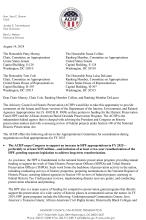Washington, D.C.—The Advisory Council on Historic Preservation (ACHP) today announced it is terminating consultation on the development of a Section 106 agreement with the Bureau of Land Management (BLM) for the Lava Ridge Wind Project in Jerome, Lincoln, and Minidoka counties, Idaho. Pursuant to its responsibilities under the National Historic Preservation Act (NHPA), the ACHP will prepare formal comments on the project and submit them to the BLM director. Once the BLM director considers and responds to the ACHP’s comments, the Section 106 review for this undertaking will be concluded.
News
ACHP Chair Bronin this week sent letters to members of the Senate and House appropriations committees on behalf of ACHP membership urging Congress to support at least a $225 million appropriation for the Historic Preservation Fund (HPF). The letter also requests a two-year minimum reauthorization of the HPF pending long-term reauthorization. The HPF funds the vital work done by State and Tribal Historic Preservation Officers, which is the backbone of preservation activity in the nation.
The ACHP also urged Congress to fully fund $3 million for the African-American Burial Grounds Preservation Program under the National Park Service National Recreation and Preservation account of the National Park Service.
Washington, D.C.—As part of the Biden-Harris Administration’s all-of-government effort to accelerate project permitting and reviews to deliver on our infrastructure and clean energy future, the Advisory Council on Historic Preservation (ACHP) is taking action on housing, climate-smart buildings, climate-friendly transportation, and clean energy that will make it faster and easier to meet the nation’s climate and housing goals while preserving historic properties.
The ACHP is offering a variety of Section 106 training opportunities this fall that will be presented virtually on Zoom, including one free webinar! Staff in the Office of Federal Agency Programs will present four timely webinars and a Section 106 Essentials course in September:
Defining the Area of Potential Effects (APE)
Wednesday, September 4, 3:00-4:00 pm EDT
Section 106 Program Alternatives
Thursday, September 12, 3:00-4:00 pm EDT
Implementing Section 106 Program Comments
